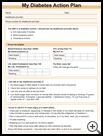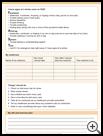
Glucose Tolerance Test
________________________________________________________________________
KEY POINTS
- The glucose tolerance test measures your body’s response to glucose (sugar). The most common use of this test is to check for diabetes.
- Your healthcare provider may poke your finger with a small needle or a small amount of blood may be taken from your arm with a needle. You will then be asked to drink a liquid containing a certain amount of glucose. You will have blood tests every 30 to 60 minutes for several hours after you have this drink. The blood is collected in tubes and sent to a lab.
- Talk to your healthcare provider about what the test results mean and ask any questions you have.
________________________________________________________________________
What is the glucose tolerance test?
The glucose tolerance test (GTT) measures your body’s response to glucose (sugar). Your body breaks down some of the foods you eat into sugar. Your blood carries the sugar to the cells of your body. You need some sugar in your cells for energy, but too much sugar in your blood is not good for your health. This test will be done after you have fasted, and again a few hours after you drink a special sugar drink.
This test is also called an oral glucose tolerance test (OGTT).
Why is this test done?
The most common use of this test is to check for diabetes. Diabetes is a problem with the way the body makes or uses insulin. Insulin is made by the pancreas, which is an organ in the upper belly. The body uses insulin to help move sugar from the blood into the cells. When the body does not have enough insulin or has trouble using the insulin the body makes, sugar cannot get into the cells and builds up in the blood.
How do I prepare for this test?
If you are having a fasting glucose test, your healthcare provider will tell you when to stop eating and drinking before the test. In most cases you will be told to eat nothing and drink nothing but water for at least 8 hours before the test.
You may need to avoid taking certain medicines before the test because they might affect the test result. Make sure your healthcare provider knows about any medicines, herbs, or supplements that you are taking. Ask your provider before stopping any of your regular medicines.
Talk to your healthcare provider if you have any questions about the test.
How is the test done?
Your healthcare provider may poke your finger with a small needle (lancet) and fill a small tube with the blood. Or a small amount of blood may be taken from your arm with a needle.
You will then be asked to drink a liquid containing a certain amount of glucose. It tastes very sweet. You will have blood tests every 30 to 60 minutes for several hours after you have this drink.
Ask your healthcare provider when and how you will get the result of the test.
What does the test result mean?
Your blood sugar level may be higher than normal (hyperglycemia) if:
- You have prediabetes (your blood sugar is higher than normal, but not quite high enough to be called diabetes).
- You have diabetes.
- If you already have diabetes
- You have not been taking your medicine correctly.
- Your medicine is not controlling your diabetes.
- You have not been following your meal or exercise plan.
- You have kidney or liver disease.
- Your pancreas is inflamed. The pancreas is an organ in your upper belly that makes insulin.
- Your body is severely stressed from an illness, infection, or injury.
- You are taking medicine, such as steroids, which can raise your blood sugar.
Your blood sugar level may be lower than normal (hypoglycemia) if:
- You have diabetes and:
- The dose of insulin or other medicine used to control your diabetes is too high.
- You took your medicine for diabetes but then did not eat or you exercised too much.
- Your thyroid, pituitary, or adrenal glands are not working normally. These glands make hormones, which are chemicals that help with things such as growth, development, and control of blood pressure and blood sugar.
- You have liver disease.
- You have problems absorbing food.
- You are not getting the nutrients you need from your diet.
What if my test result is not normal?
Test results are only one part of a larger picture that takes into account your medical history and current health. Sometimes a test needs to be repeated to check the first result. Talk to your healthcare provider about your result and ask questions, such as:
- If you need more tests
- What kind of treatment you might need
- What lifestyle, diet, or other changes you might need to make


